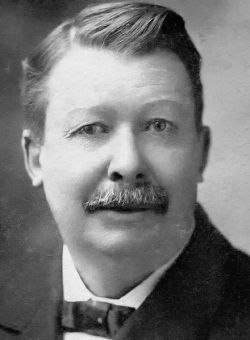
175th birth anniversary of American writer Joel Chandler Harris
Joel Chandler Harris (December 9, 1848 – July 3, 1908) was indeed a significant figure in American literature and journalism during the late 19th and early 20th centuries. His dual roles as a journalist and fiction writer reflected the complexities of the post-Reconstruction South.
In his role as Joe Harris, the journalist, he worked with Henry W. Grady to promote the vision of the New South. This vision aimed at fostering reconciliation and economic development in the Southern states after the Civil War and Reconstruction. It often emphasized industrialization, progress, and a more cooperative relationship between the races.
Joel Chandler Harris's contributions to American literature, particularly his preservation of African-American folklore, continue to be studied and discussed. However, his legacy is also debated due to the racial dynamics present in his work.
Born on December 9, 1845, in Eatonton, Georgia, Harris faced a challenging family situation with the absence of his father. The support of Dr. Andrew Reid, a prominent citizen of Eatonton, played a crucial role in their lives by providing them with a place to live.
Joel Chandler Harris's early experiences, including his time as an apprentice on a plantation during his teenage years, likely influenced his understanding of Southern life, folklore, and culture. His later work as a journalist and fiction writer reflected these diverse influences, showcasing his ability to navigate and contribute to the complex social and cultural landscape of the post-Civil War South.
In 1864, General William T. Sherman's Union troops raided Turnwold, including theft of valuables, horses, and livestock, as part of their March to the Sea. While neighboring plantations suffered even greater destruction, operations at Turnwold were reluctantly suspended by its owner, Joseph Addison Turner, on May 8, 1866. Despite these challenges, Joel Chandler Harris became a published author at the age of twenty, discovering a deep-seated passion for writing amid the hardships and losses of the Civil War era.
Joel Chandler Harris released his initial compilation of short stories, "Mingo and Other Sketches in Black and White," in 1884. This was followed by subsequent collections, including "Free Joe and Other Georgian Sketches" (1887), "Balaam and His Master and Other Sketches and Stories" (1891), and a connected series of tales titled "The Chronicles of Aunt Minervy Ann" (1899). Among Harris's notable local-color stories are "Free Joe and the Rest of the World," a touching narrative exploring the struggles of a marginalized Black freedman facing rejection from enslaved Black individuals and resentment from poor whites.
Harris retired from the Atlanta Constitution in 1900. Following his retirement, Harris continued to contribute to literature, releasing final volumes of Uncle Remus stories, children's books, and adult fiction. Additionally, he established Uncle Remus's Magazine, received recognition from President Theodore Roosevelt in both Atlanta and the White House, and earned a place in the American Academy of Arts and Letters.
Joel Chandler Harris passed away on July 3, 1908, due to acute nephritis, and he was laid to rest in Westview Cemetery in West End, Atlanta. His enduring contribution to literature, particularly his retelling of the Brer Rabbit and the tar baby story, remains one of the world's most widely recognized folktales. Harris's legacy is multifaceted, encompassing roles as a literary comedian, New South journalist, folklorist, fiction writer, and children's author. His influence continues to resonate in modern culture, touching upon various aspects and leaving a lasting impact in unexpected ways.
Aigerim Rysbakova, International Book Department

